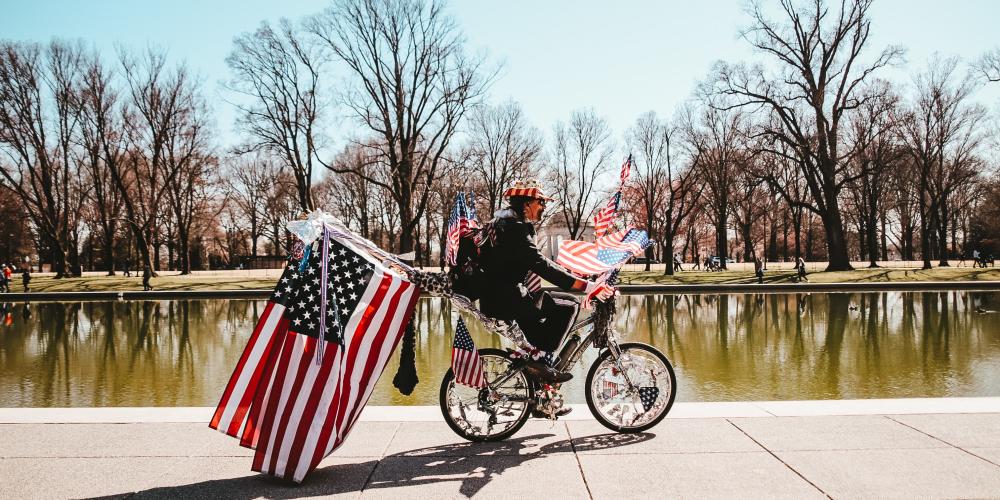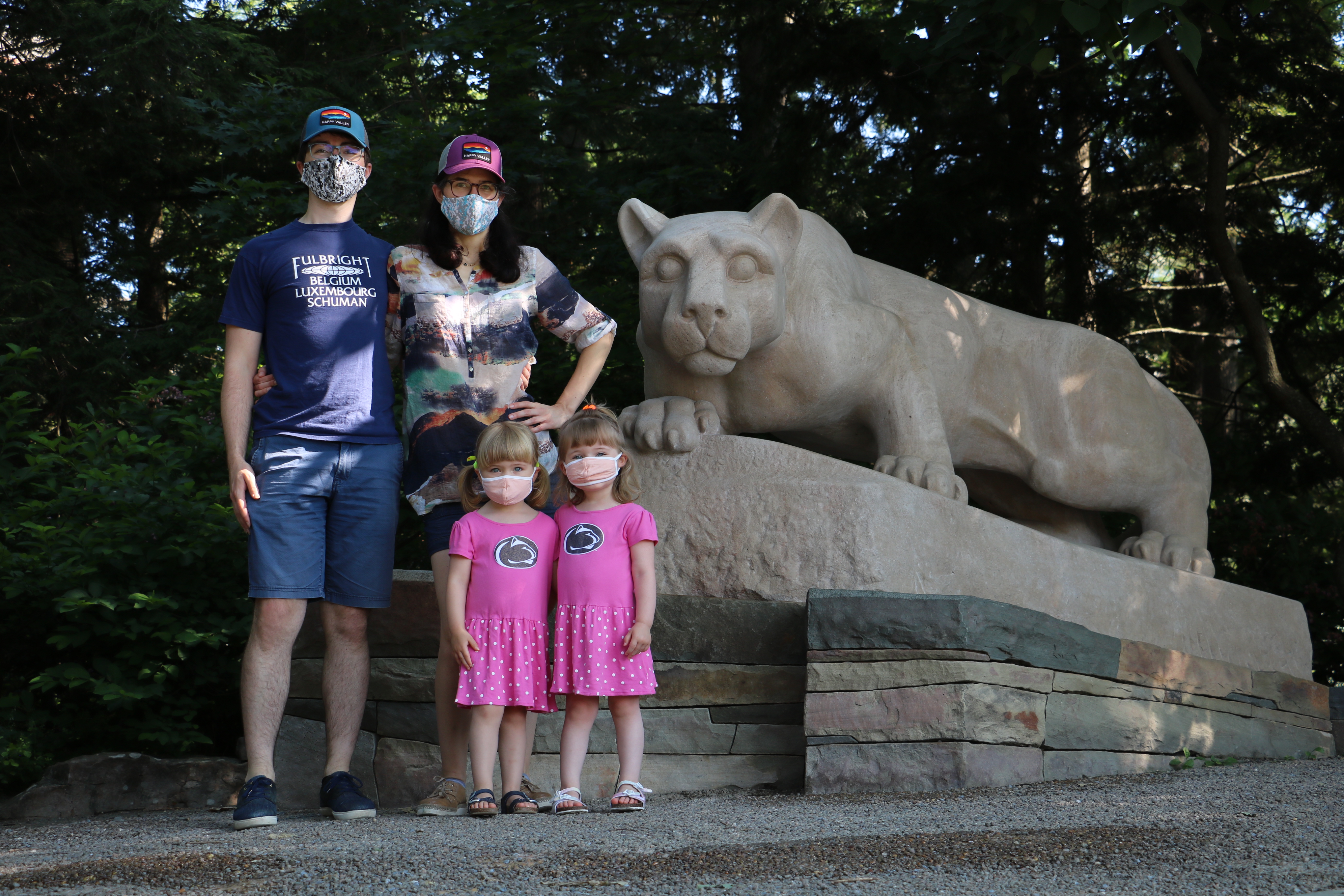
For many the United States of America (USA) is still synonymous with ‘the land where dreams come true’, ‘the land of opportunity’. From the start and throughout its history, it has been the go-to place to reinvent yourself, to set your life on a pathway to success, and the realisation of all your ambitions. And its lustre hasn’t faded one bit, so the US merits more examination from our students and academics alike. There are many grants and scholarships that open the American doors to our VUB community; one of them is the Fulbright Scholarship.
In 1948 the Commission for Educational Exchange between the United States of America, Belgium and Luxembourg was set up to increase a mutual understanding through academic exchange. Today, the Fulbright Commission provides grants for graduate study (i.e. for a first or second Master’s Degree), PhD, pre and post-doctoral research, foreign language teaching and university lecturing in the USA. Erica Lutes, a New Jersey native, has been the executive director of the Fulbright Commission office in Brussels for 12 years. Sonny Willems has been working for Fulbright for four years and is programme officer for Belgians going to the US.
Ambassadorial role
“Each year, we have about 120 Belgian applicants, with on average 25 who receive the scholarship, but we want to see more of them go and get that unique experience,” Erica explains. “The Fulbright programme is the Rolls-Royce of scholarships, but maybe not enough students and academics are aware of it, or their perception is skewed towards ‘too hard to get’. It is a merit-based award system, but it is very much focussed on people. We want people who are engaged with society and their communities, and who go on their American adventure, but are happy to move outside their study halls, research laboratories and libraries, and take advantage of this unique opportunity to explore the US, engage with the local communities, and then bring back that experience to Belgium to share their excitement and passion. In short, we don’t just want excellent students, researchers or lecturers. We want ambassadors.”
Sonny explains what constitutes a ‘perfect Fulbrighter’: “Researchers and lecturers from all disciplines and at all stages of their careers can apply, although clinical research is typically not suitable due to visa restrictions. For students, we look for degree-seeking students who want to go to the US for a one or two year Master’s degree.” The Fulbright Commission looks for excellent grades, and first-rate research projects and objectives, but the personal statement that goes with the application, as well as someone’s personal motivation and commitment might well trump the grades. “We really look for what drives someone to take on this experience; what is their motivation beyond the educational and academic aspect; how will they use this experience when they return to Belgium,” Sonny explains.
“The Model Fulbrighter”
The “model Fulbrighter” has a name: Sam Poppe. He obtained his PhD at VUB in Earth Sciences, and is currently a researcher with the Space Research Center – Polish Academy of Sciences, in Warsaw (Poland). In 2019-2020 he got a Fulbright scholarship to go to Penn State University (Pennsylvania, USA). “My supervisor at VUB suggested I look into applying, and I’d met someone else at the university who’d been to the US with their whole family (including the kids), so I felt inspired to go for it,” Sam says. “I wanted to go to the US because it is one of the top countries in my research field of volcanology. As a country, from a personal perspective, it has always fascinated me. I had a physics professor during my Bachelor degree who had visited many US national parks and he started every lecture with a picture of one of them. That fascination stayed with me.”
Sam calls the Fulbright interview the ‘weirdest ever’. But not in a bad way. “I wasn’t as prepared as I could’ve been, as it wasn’t about your scientific goals, achievements, etc. It was a very personal one, where I got asked to describe a non-working day in my life in the US – how I’d imagine it. It wasn’t science-driven at all.” Erica explains: “When we select our Fulbright recipients, we don’t just look at the grades. They matter, of course, but we want something extra. We look at the personal side, because we are ultimate looking for an ambassador. Someone who comes to the US and will represent Belgium, and who will soak up the American experience, and then take all of that back to Belgium, and inspire others to go on the same adventure.” [continue below the photo of Sam and his family]

Some people might associate the Fulbright scholarship with it being “only for the select few”, maybe with some overtones of ‘for the monied”. Erica remarks, “The allowance you get from the Fulbright scholarship if you are a scholar, should be sufficient, as there are no tuition fees. For students, it might not cover everything, because of the tuition fees, and then it also depends on which US university they go to, but you can supplement this with other grants to cover the difference.” Sam explains he got a full BAEF (Belgian American Education Foundation) scholarship and a third of a Fulbright one, and that covered everything for him, his wife and their twin daughters: “We were in the US during the pandemic, so we were restricted in what we could do, where we could go, so we spent less as a result, but ultimately the funding we got was sufficient.”
The Fulbright Commission (as well as BAEF), through its EducationUSA advice centre, can give guidance to those who need additional grants to finance their stay in the US. It is very common to apply for several grants in the US and other countries, but not in Belgium. As a result students in Belgium mostly don’t realise the number of grants that are available, or how to go about getting them. Erica adds that at Fulbright they are looking into more diversity scholarships, to move away from this perception that the Fulbright scholarships are only for those with means. “The grades matter, yes. It is still a merit-based programme, but we definitely look beyond those, because we want someone who has an engagement, a commitment to take on this societal bridging role between the two countries.”
Apply, Apply, Apply
Sam is very excited about his Fulbright experience. “It was incredible. You join this fabulous network that creates a wealth of opportunities. It is a very unique experience. But you also get so much support during your stay. I got support from Erica and Sonny, but also from people at the international institute for Education (IIE) in the US. That support from Fulbright is unheard of from other programmes, especially as we were there in the midst of a pandemic with two small children.” So what are Sam’s tips to applicants?
“Apply, apply, apply. Just do it. You won’t regret it. And prepare, by scouring the website, check alumni testimonials, speak to colleagues and professors who have done it before. Get inspired by them and let your passion shine through in the essays and letters you write, and in the interview. Be flexible and creative while going through the application process, and remember that it is all worth the effort. Going to the US with a Fulbright scholarship is not just a study/work stay; it is about community engagement and being the bridge between cultures. Fulbright really is a global family. “
>> All info on the Fulbright scholarship opportunities: https://www.fulbright.be/ and for information on the process at VUB, please contact international.relations@vub.be
>> Reach out to Sam if you want to know more about his Fulbright experience, via twitter @SamPVolcano, or via his website